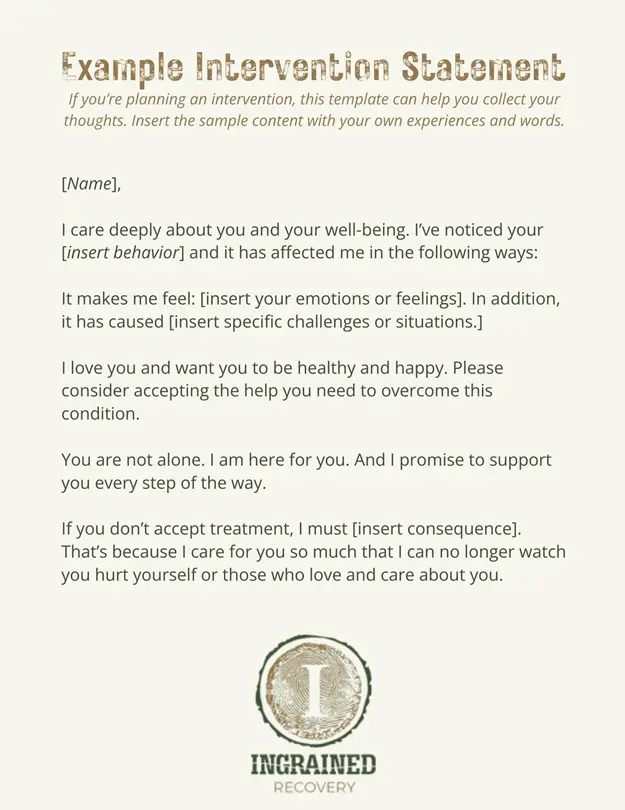Getting Intervention Help With Our Experts at Ingrained Recovery
Getting help from a drug and alcohol intervention specialist can be a lifeline for family members or friends struggling to save a person struggling with addiction. You might want desperately to help ease a loved one’s addiction or harmful behaviors.
If you’ve ever flown, you have heard the flight attendants warning you to apply your own air mask before helping others in an emergency. That’s important because you cannot help others if you are not receiving sufficient airflow to survive and help other passengers. Hiring a certified intervention professional is the air mask that will allow you to breathe again.
At Ingrained Recovery, we can assist with the formal intervention process. Our professional interventionist has experience with helping people involved guide their family members to accept treatment for a drug or alcohol addiction.
We invite you to continue reading if your loved one’s life is at risk because of alcohol or drug addiction or dual diagnosis condition (additional mental health disorders.)
Get Effective Treatment Programs at Ingrained Recovery

Family Members Should Know When It’s Time for a Professional Interventionist
According to the National Institute of Mental Health, about 23.1% of the American population, or 59.3 people, live with a mental illness.
We share that fact because you must know that you are not alone in the fight.
When is enough, well, enough?
Do you call in professional interventionists, and then the addicted person shows destructive behavior?
When they become combative or aggressive? Or when they overdose? Many family members don’t know what to look for in their loved one’s behavior, which indicates the addictive behaviors have spiraled beyond their control.
Here are a few warning signs that it’s time to urge them to get drug or alcohol addiction treatment:
Neglecting Responsibilities (Including Hygiene, Children, or Work)
One clear sign of a substance user losing control is a new neglect of responsibilities. Once, the person was juggled their drug abuse or drinking with daily life.
Now, with the situation worse, they can no longer keep all the balls they used to juggle in the air. They may wear wrinkled, dirty clothing, forget to brush their teeth, forget to pick up their children for school or be absent from work more often.
Lying to Loved Ones About Whereabouts or Finances
The person may need a professional interventionist if they hide their substance abuse or lie about their comings and goings.
You might also notice that they lie about how they’re spending money. If they had a good job and a nice place to live but are now on the brink of eviction, they could be headed in a very perilous situation.
Destructive or Dangerous Behaviors
An alcohol or drug addiction could mean hearing or seeing your loved on participate in dangerous things they’d never done before. That could be meeting dealers in dark alleyways, driving while impaired, or even overdosing.
Self-Isolating or Removing Themselves from Family Members
Some people know they are losing control over their substance use. They may avoid feeling ashamed by isolating themselves from their family, partner, or even a special loved one.
Others do this because their brain now perceives spending time on substance use as more rewarding than family time
A Substance Use Disorder Leads to Worsening Physical or Mental Health Disorders
Long-term substance abuse is incredibly hard on the human body and mind. You might notice visible physical signs of drug or alcohol addiction: dental issues, needle tracks or abscesses, bloody nose issues, or rapid weight loss.
It’s the mental illness aspect that’s harder to see, but you can see the lack of joy, depression, and slumped shoulders that reveal the inner turmoil.

Interventions with a Professional Interventionist Are 90% Successful
You may feel apprehensive about hiring an interventionist. Relax!
The National Council on Alcoholism and Drug Dependence (NCADD) has studied success rates of interventions. Skilled interventionists report success rates that exceed 90%.
Get Proven Detox and Rehab Options at Ingrained

Eight Crucial Steps of the Intervention Process
Professional interventionists are licensed professionals, usually psychologists or social workers with experience in the addiction field, with at least a Master’s Degree. Families turn to interventions usually only after conventional methods of urging their loved one to seek treatment have failed.
The professionals involved in addiction intervention may handle the process with some slight variations, but read on for an overview of the general process:
Step 1: Planning with the Help of the Addiction Intervention Specialist
A successful intervention takes careful planning. You’ve hired professional intervention services, now it’s time to get to work. Invite the person’s sober friends, family members, or even concerned colleagues to the planning meeting.
They must be committed to confronting the person struggling and willing to participate in the drug intervention process actively.
Step 2: Answer Questions and Supply Accurate Information to the Interventionist
The intervention specialist will want to know more about the person’s substance abuse and its negative effects. People in the intervention field are highly knowledgeable about addiction treatment and recovery.
Intervention specialists are there to guide you through this process. Be honest and accurate, and answer questions as wholly as possible.
Step 3: Forming the Intervention Team and Support Staff
Get the official intervention team together. These people include the loved ones and friends from Step 1. However, it should also include support staff and sometimes more professionals present to assist the addiction intervention specialist.
Each team member plays a clearly defined role and prepares to speak up during the intervention.
Step 4: Each Family Member Writes a Statement to Share
Family members and loved ones should write individualized statements that describe how the person’s drug and alcohol addiction has impacted them. These can be written as heartfelt letters but address the person’s behaviors due to substance abuse; they should not be personal attacks on their character.
Here comes the more challenging part of the statement for most families. The family members need to have clear consequences they’ll enforce if the loved one refuses the treatment options. That might mean cutting off financial resources, limiting contact, or other boundaries to protect.
Step 5: Rehearsing for a Good Outcome During the Real Intervention
Intervention specialists usually want to practice the intervention with the team members, sometimes role-playing possible reactions from the loved one.
Families should all be on the same page so that all can communicate effectively and convincingly during the alcohol or drug intervention.
Step 6: The Formal Intervention Meeting (What’s the Interventionist’s Role?)

Most intervention specialists suggest a safe, neutral spot to meet with the person. Each team member will read off their statements and express their genuine concern about the drug abuse. Each person should also remember during the intervention that the goal of the meeting is to ask them to accept treatment at the pre-determined addiction recovery center.
Interventions often surprise the loved one (which is really why they get angry – they feel disarmed.) Their reactions can be hurtful or accusatory. No matter how they respond, stay calm and supportive. Remember that any ugly words are the result of the addiction, not your friend or family member.
The interventionist plays the role of facilitator. They will make sure the conversation remains as positive as possible and respectful to both the family members and the loved one struggling with addiction.
Step 7: Offering Treatment Options and Support the Recovery Process
The interventionist will help you develop a clear, actionable plan in mind as you present rehab options. Your family will need to convince your loved one to accept the treatment program. Most people resist the help for their drug and alcohol problems but ultimately accept it during the intervention.
Step 8: Ongoing Support for Your Loved One
Your loved one needs your help even after accepting help. For instance, families should attend family counseling if treatment centers offer it. Stay involved and be a cheerleader for your loved one; the drug intervention is not an “end.” It’s a starting point for the recovery journey for your loved one.
What if the Family Member Struggling with Drugs Refuses the Treatment Plan?

Some interventions don’t work the first time. Sometimes, the person who needs addiction help walks out of the intervention or makes wild accusations against their loved ones. A professional interventionist will tell you that they’ve seen it all. Still, there is hope, and you should try another intervention.
Shift your mindset. Instead of taking a “no” as a “forever no,” file it in your mind as a “not right now.”
Remain calm and tell them that you still love them but fear that drug addiction will destroy them.
Remind them of the consequences you named in your statement firmly, but kindly tell them that you must draw your line in the sand. It will be difficult, but you must impose those consequences if the intervention fails.
Also, know that failed interventions do not mean your loved one doesn’t love or respect you. It merely means the drug addiction has seized complete control, and multiple interventions may be necessary to convince them to attend a treatment center.
Make sure you take good care of yourself and stay strong to try another intervention again soon.
Up To 100% of Rehab Costs Covered By Insurance
Ingrained Offers a Proven Support Destination Following Intervention
Ingrained can help with intervention services, and we offer evidence-based addiction treatment and support for your loved one’s recovery process.
If you need professional addiction care to present during an intervention, please call us today. We are glad to help. All calls are confidential, so please reach out today.
